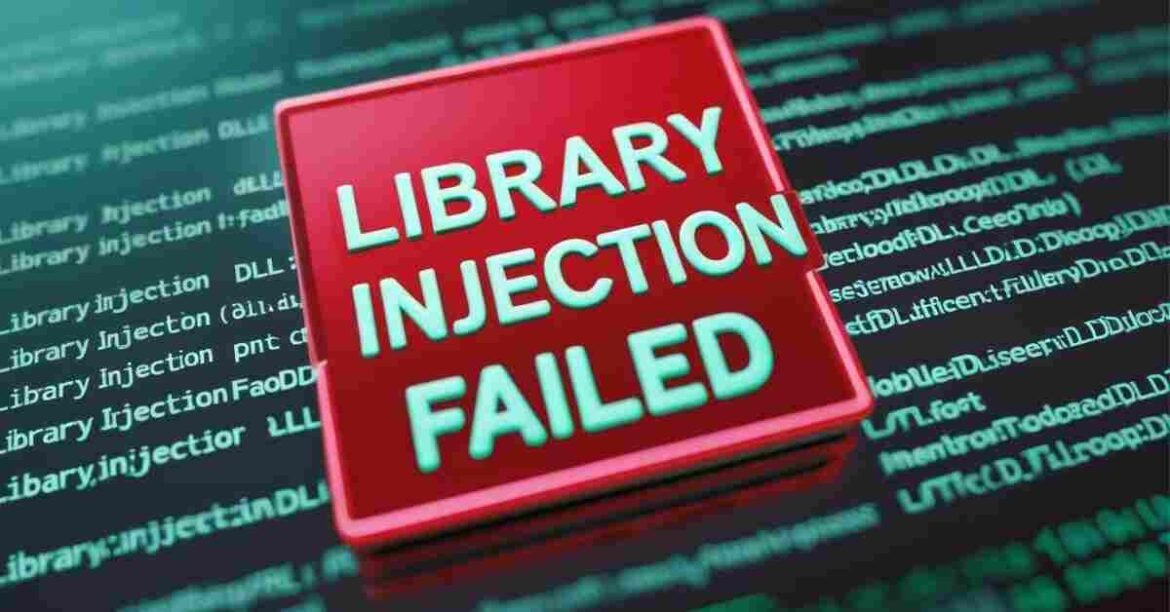When working with system-level operations, drivers, or advanced software integration, you may encounter the error: “library injection failed: mdc_shuttingdown not found.” This issue can appear suddenly and disrupt performance or prevent specific libraries from loading. Although it might seem complex, understanding what causes this error and how to resolve it can save you time and frustration.
What Does “library injection failed: mdc_shuttingdown not found” Mean?
This error typically refers to a failed attempt by an application to inject or load a dynamic link library (DLL) or system component. The “mdc_shuttingdown” is usually a variable or a process flag meant to indicate that a system or service is shutting down. If the injector cannot locate this specific value, the injection process fails, leading to the mentioned error.
The primary keyword – library injection failed: mdc_shuttingdown not found – is closely tied to system development, debugging tools, software hooks, and malware analysis environments. It can also appear when using third-party game mods, virtualization tools, or performance monitoring software.
Common Causes of This Error
Understanding the source of the problem is essential to resolving it effectively. Here are the most common reasons:
1. Corrupt or Missing DLL Files
The required library file may be missing, corrupted, or not properly registered in the system.
2. Improper Injection Attempt
Some software tries to inject code or DLLs into a running process. If it fails due to permission issues or missing markers like mdc_shuttingdown, this error can occur.
3. Anti-Virus or Anti-Cheat Interference
Security programs may block injection attempts, flag them as suspicious, or quarantine necessary files.
4. Incompatible Software or Version Conflict
An outdated or incompatible version of the application trying to perform the injection may trigger this issue.
5. Software Shutting Down Prematurely
The target process may already be in the shutdown state, which means mdc_shuttingdown is either triggered or removed before the injection could succeed.
How to Fix “library injection failed: mdc_shuttingdown not found”
Fixing this error involves several possible solutions. You may need to try more than one depending on your setup.
1. Check System and Application Compatibility
Ensure that the application or library you are trying to inject is compatible with your system version (32-bit vs 64-bit). Version mismatch often causes injection failures. Try running the application in compatibility mode or as administrator.
2. Reinstall or Repair the Affected Program
If the error is associated with a specific application (e.g., game modding tools, developer software, monitoring apps), reinstall it completely. This step will restore all necessary libraries, including those referencing mdc_shuttingdown.
3. Disable Conflicting Background Programs
Security software or background services can block injection activities. Temporarily disable your antivirus or firewall and check if the error persists. Ensure you trust the application involved before disabling protection.
4. Manually Register Missing DLLs
If a DLL is present but unregistered, you can register it using Command Prompt:
bash
CopyEdit
regsvr32 yourlibrary.dll
Make sure you replace yourlibrary.dll with the actual file name. You’ll need administrator rights to execute this.
5. Update All System Drivers and Software
Keep your Windows system, graphics drivers, and essential development libraries (e.g., .NET, Visual C++) up to date. Outdated environments can conflict with dynamic libraries or injectors.
Preventing the Issue in the Future
To avoid encountering library injection failed: mdc_shuttingdown not found again, consider these best practices:
Always Use Official Sources
Install libraries and tools from trusted and official sources only. Unverified or third-party modifications often lack critical components or use outdated code.
Backup Before System Tweaks
When working with injection tools or DLL modifications, always backup your system or registry before making changes.
Use Stable Versions
Alpha or beta versions of applications are more prone to bugs, including failed injections. Stick to stable releases for critical operations.
Run Regular System Checks
Use system maintenance tools to scan for corrupted files or registry issues. The built-in sfc /scannow command in Windows is particularly useful.
Technical Breakdown: How DLL Injection Works
DLL injection is a process where external code is forced into a program’s address space. It is used by legitimate tools (like debuggers or overlays) and by malicious ones (like spyware). Here’s how it typically works:
- The injector locates the process to target.
- It allocates memory within that process.
- The injector writes the DLL path into this memory.
- Then it starts a remote thread calling LoadLibrary() with the DLL path.
If during this process a flag like mdc_shuttingdown is not found or inaccessible, the injector fails. That’s why this keyword shows up in the error message.
When You Should Worry
If this error appears while running a legitimate tool or during debugging, it’s likely a configuration issue. However, if you see this unexpectedly—especially while browsing or doing nothing intensive—it might be a sign of:
- Unwanted background software or scripts
- A partially removed virus or malware
- Broken injection attempts from outdated drivers
In such cases, scanning your PC using a trusted antivirus is a smart step.
Final Thoughts
The error “library injection failed: mdc_shuttingdown not found” may sound complicated, but it generally points to a failed attempt to interact with a system or application using injection methods. Whether you’re dealing with developer tools or mod frameworks, the key lies in ensuring system compatibility, maintaining updated software, and minimizing third-party conflicts.
For most users, a clean reinstall of the problematic app or adjusting system settings can solve the issue. If you are a developer or power user, further debugging using log files or monitoring tools might be required to fully trace the injection failure.
